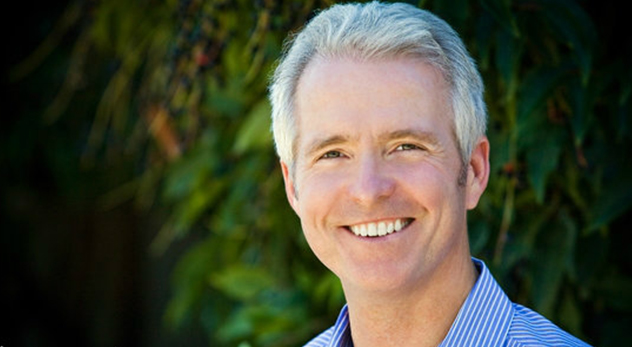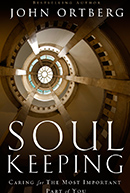
Popular pastor and author says we “live on the planet of lost souls” and identifies what he calls the “nine needs of the soul.”
John Ortberg believes many people today have a soul problem. In his new book, “Soul Keeping: Caring For the Most Important Part of You,” says we “live on the planet of lost souls” in which live dis-integrated lives. The secret to remedying this problem begins with recognizing what he calls the nine needs of the soul.
Ortberg is a credible voice on the matter as pastor of Menlo Park Presbyterian and the prolific author of such modern classics as “If You Want to Walk on Water, You’ve Got to Get Out of the Boat” and “The Life You’ve Always Wanted.” (He is the father of RNS’ own Laura Ortberg Turner, which is his real claim to fame.) Here, we discuss how we people can cultivate healthier souls.
RNS: How do you define the soul? Is it different from our “selves” or our “spirits”?
JO: The soul is what integrates separate functions into a single, organic, whole creature. That’s why the search for harmony and integration and connectedness is a “soul” function. The soul is the deepest dimension of our existence. It captures the reality of life before God in a way that the word “self” does not. Think of the difference between the words “soul-ish” and “selfish.”
“Spirit” refers more generally to the power or energy that comes from our wills. This difference is still reflected in current language; we might speak of a “spirited” horse but we would talk about a “soulful” artist—not the other way round.
RNS: What does the Bible say about our souls?
JO: The Bible speaks of the soul often—although more recent translations are much more likely to substitute words like ‘life’ instead of using the word ‘soul.’
One of the most striking and misunderstood statements about the soul in the Bible is Jesus’ observation: “What does it profit a person if they gain the whole world but lose their soul?”
I always used to think this meant it does no good to get lot of money and pleasure if you end up going to hell. But that’s not what Jesus is saying. If a soul is broken or mal-functioning, our wills and our values and actual behavior and our desires and our facial expressions and our secret thoughts will constantly be at war with each other. We will be incapable of soul satisfaction—let alone a meaningful or truly good life. Jesus was not telling people to commit to the right religion in order to get their afterlife taken care of. He was making a brilliantly diagnostic observation about the nature of human life.
RNS: You mention that a healthy soul is an intact soul—connecting our minds, hearts and bodies all the while connected to God. What is the enemy of a healthy soul?
JO: The ultimate enemy of a healthy soul is sin, because the soul cries out for wholeness within the person and between the person and God, others, and creation. It’s the nature of sin to dis-integrate the sinner. If I gossip unfairly about you, I have to train my face to disguise my contempt when I’m with you. I have to distort my own thoughts to rationalize my self-image. Over time gossip becomes a habit—and now my bodily habits are ruling over my will rather than having my body serve my will. My feelings of resentment toward you are inevitably at war with my desire to be at peace. And I cannot deeply with God while holding on to defiance of his will. My soul becomes dis-integrated at every level, all the time.
RNS: In the book, you mention nine needs of the soul. What does the soul need the most?
JO: A great Old Testament scholar named Hans Wolter Wolff described the Hebrew word for soul (nephesh) as “needy man.” Sometimes when I think of the soul I think of the Bill Murray character in “What about Bob?,” whose mantra is “I need, I need, I need…”
The neediness of the soul is not an accident. Wise observers many centuries ago noted that human beings are finite in everyway except one: we have an infinite capacity to desire more. We are infinitely needy. In this way, the soul is a mirror image of a God who has an infinite capacity to give.
RNS: What are signs of a healthy, intact soul? Of an unhealthy soul?
JO: Persons are like cars, at least in the sense that you have to understand what the parts do if you’re going to take good care of them and keep everything functioning well. The essential parts of the person are the will (the freedom and creativity to say “yes” and “no” and bring things into being), the mind (including thoughts and feelings), the body (which are filled with appetites and habits that largely govern our behavior), and the soul, which ties these all together. In a healthy soul, the body has been trained to obey the will; the will in turn consistently chooses what the mind knows to be good, all the parts work together in harmony, and are peaceably connected with God, creation and (to the extent possible) other people. The unhealthy soul is the opposite.
RNS: You mention throughout the book that we “live on the planet of lost souls.” What does that mean?
JO: One of the indications of the depth of the soul is that in the ancient world people would speak to it as if it were a separate person: “Why are you downcast, O my soul?” Or “Bless the Lord, O my soul.” This is never done with other parts of the person; with the mind or the spirit.
In our day, the word “soul” is increasingly unfashionable. People may think that science has proven it does not exist.
When people do not recognize their need to connect with God, or do have the various parts of their lives integrated with each other and with spiritual reality—the soul becomes lost. Dallas Willard said that the soul is not lost because its going to the wrong place; it may end up in the wrong place because its lost. So the place to begin is simply to acknowledge that we have a soul. I’ve noticed that when the simple sentence: “You have a soul” is spoken to a roomful of people they have a way of getting quiet.
RNS: What is the relationship between the soul and suffering?
JO: A very old phrase that won’t go away is the expression: “the dark night of the soul.” It’s often used in our day to describe any suffering. But as originally used it had a more specific definition: it was the condition of the soul when God’s presence and consolations seem no longer to be available. In the dark night, I suffer not only whatever loss or hurt may be going on in my circumstances, I suffer what seems to be the confusing silence of heaven as well.
Ancient wisdom—not least the wisdom recorded in many places in the Scriptures—suggested that suffering itself can be redeemed by God, and that the soul itself is being kept and guarded and nourished by God even when the person may not realize it.






